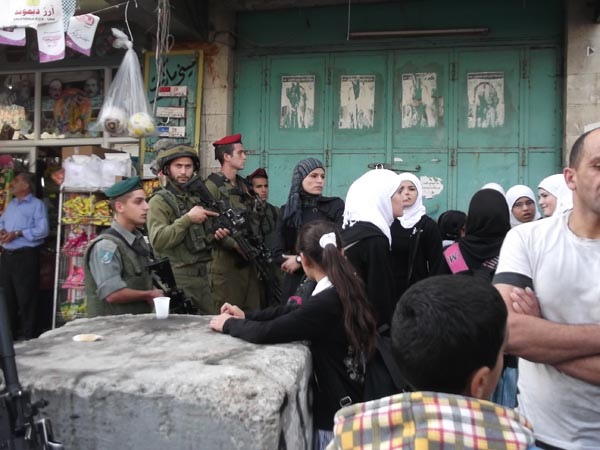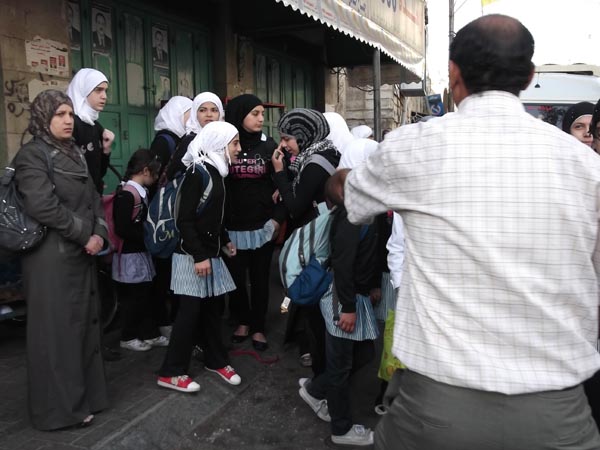The IDF has suddenly decided to force Hebron school teachers to go through checkpoint metal detectors that place their health at risk. Children from the school, accustomed to settler and army harassment, have joined them in their protest at Checkpoint 56
By Ben Lorber
For nearly two weeks, a group of young schoolchildren and female teachers from the Qurduba School in Hebron have been holding lessons every morning outside of Checkpoint 56, to protest increased security measures at the checkpoint.
For the past seven years, teachers at the Qurtuba School have been allowed to bypass the usual metal detectors at the checkpoint, and cross through a separate gate in order to reach their school, which lies in the treacherous area between the aggressive Israeli settlements of Tel Rumeida and Admot Yishai. On Tuesday, October 11, for no apparent reason, the army announced that it had suspended this procedure, and that teachers must pass through the metal detectors and present their bags for inspection every day. At the same time, the army announced that pregnant women and people with heart devices or other medical complications, who had previously also bypassed the metal detectors, may no longer do so, and must now put their physical well-being at risk on a daily basis.
That same Tuesday, the teachers refused to submit to inspection at the checkpoint, and instead held an impromptu silent demonstration on the Palestinian side. At 9 A.M., their students, boys and girls between the ages of six and 13 and now deprived of education, marched to the checkpoint carrying signs and chanting slogans. Israeli soldiers threw them up against stone walls, kicked and hit them with the butts of rifles, forcibly dragged them through the checkpoint, and one settler attempted to push them out of the way with her car as she drove by; nine children were sent to the hospital with injuries.
One of those injured was 11-year-old Yazan Sharbati. “There were no teachers in the school,” Sharbati relates in an interview with the International Solidarity Movement, adding “We protested to the army that we wanted our teachers. The army told us to go back to school, and we told them that without teachers there is no school…I was so afraid that something bad was going to happen. [The soldier] pushed me very hard.”
Over the next two days, students and teachers, joined by the Director of Education in Hebron, representatives from the Governor’s office, and local and international press, held lessons outside the checkpoint, standing up at intervals to chant, “We will not return, we want our right to education!” Mohammed Abutherei, Director of Education in the Hebron Municipality, was optimistic. “God willing the army will allow the students and teachers to pass normally,” he said, “because for four days now the children cannot learn properly! Why do they do this to our students?”
His optimism was short-lived, however, when on Sunday a line of about 20 soldiers and border police forcibly pushed the schoolchildren back from the checkpoint, and announced over a loudspeaker that the crowd would be arrested if it did not disperse within five minutes. “This is their character!” exclaimed Tamer, a Palestinian activist from the group Youth Against Settlements, based in Hebron. “This is their behavior, this is their ethics! Yes, we are terrorists,” he said sarcastically, “because we want to learn, we want an education!”
When the crowd remained, soldiers projected a high-pitched siren noise nicknamed ‘The Scream,” and fired rounds of tear gas to forcibly scatter the crowd. In the rush to flee, one teacher was arrested, and at least five were injured as multiple rounds of tear gas were fired down the main streets of Hebron for 20 minutes in the middle of the morning traffic.
Palestinian residents of Hebron suspect territorial motivations underlying the Israeli army’s seemingly random decision to force Qurtuba School teachers, who as individuals have peacefully passed through Checkpoint 56 for seven years, to now submit to daily metal detector scans and personal inspections. Abutherei said, “Now that the school is closed [for these days] I’m afraid the settlers will attack the building, or try to take it over”. Similarly, Tamer claimed that “this is the first step for evacuating the school. They want to close the school because this is an apartheid state. They want to make the whole area for Jews only.”
The school sits atop a hill in the middle of downtown Hebron, within ample view of the Beit Hadassah, Tel Rumeida and Admot Yishai settlements, each of which consists of a few buildings and a handful of settler families. Across the street from the entrance to the Qurduba School, a door has long been adorned with graffiti reading “Gas The Arabs! JDL [Jewish Defense League].” Scarcely a month passes by when its students and teachers are not harassed or assaulted on the way to or from school, or when the school building is not vandalized or set afire (for a partial list of attacks against the Qurduba School, see the Tel Rumeida Project).
Says Abutherei, “It’s very hard to have education in H2 [the Israeli settlement district of Hebron]. The occupation affects [the children’s] social health. The students suffer from fear, worry and sadness. How to get an education, how to learn to read when you are attacked by settlers on the way to school? The same for the teachers…we need students to learn in safety, and not to have to worry about these things.”
The protesters have said that they will continue until teachers can once again walk to school without IDF harassment.
Ben Lorber is an American activist working with the International Solidarity Movement in the West Bank, and a journalist working with the Alternative Information Center in Bethlehem. Visit his blog at freepaly.wordpress.com.


